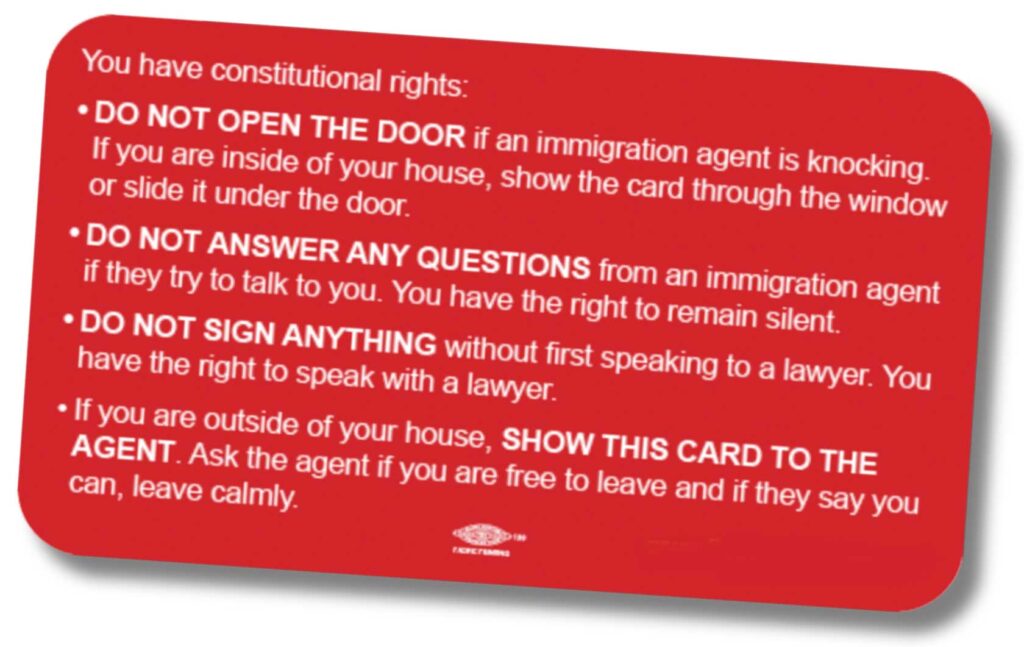
Amid an increase in immigration enforcement efforts in recent weeks, local advocates are encouraging immigrants to review their constitutional rights when they interact with U.S. Immigration and Customs Enforcement.
“The only way that people can protect themselves at this point is by enforcing their own rights,” said Sarang Sekhhavat, chief of staff at the Massachusetts Immigrant and Refugee Advocacy Coalition (MIRA). “Even if the law enforcement isn’t going to care, the judges will.”
Sekhavat said that, in his mind, the most important thing immigrants can remember is they have a right to remain silent.
“[ICE agents] will do anything they can to get people to admit to whatever they can get them to admit to,” he said. “I think, really, the right to remain silent is absolutely vital in these cases.”
That right to remain silent is one of a handful of rights that advocate groups are quick to remind immigrants of. Others include the right to call a family member or lawyer, the right to call a consulate, and the right to an attorney — though, notably, immigration cases are generally considered civil proceedings, not criminal ones, and the court is not required to provide one. The ACLU recommends asking for a list of free or low-cost alternatives and asking the court for more time if you do not have a lawyer.
In a webinar from February instructing service providers and community organizations on how to support the rights of immigrants, Catherine Ramirez Mejia, an access and resource specialist from MIRA, said that talking about what rights immigrants have is an important step to try to keep communities safe.
“During this time of uncertainty and during this time of high anxiety, we can remember that it’s important to learn about immigrant rights, it’s important to practice asserting our rights and it’s important to prepare with family,” Ramirez Mejia said in the February webinar.
In that webinar, Ramirez Mejia also said it’s important for immigrants to limit the amount they must interact with ICE as much as possible.
If an ICE agent shows up at an immigrant’s door, she said, the resident should present a Know Your Rights card — a wallet-sized print-out that states various rights anyone in the United States has, whether they are a citizen or not. They should show that card through a window or slide it under the door but should refuse to open the door to agents who cannot present a warrant that is both signed by a judge and has their name on it.
Those cards can be printed out from MIRA’s website.
“They do not need to know how to say any of the words on this card. They just need to be able to remind themselves to use it and to have it available,” said Ramirez Mejia of the card, which has statements affirming a right to remain silent, a right to not let agents in without a warrant signed by a judge and a right to not have belongings searched, citing the constitutional amendments those rights stem from.
And if an ICE agent approaches an immigrant in public, an immigrant should remain calm and not resist but should ask if they are under arrest or if they are free to leave. If they are free to leave, they should calmly walk away.
Legally, immigrants over 18 with legal immigration documentation must carry it with them. Immigrants without permanent legal status should never show false documents.
In the webinar, Ramirez Mejia also encouraged immigrants to prepare for possible interactions with ICE. She recommended they memorize phone numbers of family, friends, and a lawyer; that they practice asserting their rights; and that they think of a citizen or someone with a legal immigration status who can pay their bond if arrested.
She also encouraged families to prepare by having discussions about who will take care of their kids in their absence; make plans for meeting kids’ educational, medical and emotional needs; and what the family might plan to do to reunite.
MIRA offers a family preparedness guide for immigrant families to consider what steps they might want to take ahead of a possible ICE encounter.
Sekhavat said that citizens and those not at risk of deportation can take steps to prepare for encounters with ICE, too, and encouraged others to take steps to support their immigrant community members.
“It really comes down to just protecting the members of our communities, watching out for our neighbors, like we normally do,” he said.
Sekhavat said that others should be prepared to document and record encounters between ICE agents and immigrants in their community. In Massachusetts, it is legal to record audio and video in public spaces — including the actions of law enforcement officer, as long as the recording does not obstruct their official duties.
“There’s been a lot of claims and counterclaims. It’s a lot of, he said, she said, kind of things going on in terms of a lot of these individual enforcement actions,” Sekhavat said. “Some of the only ways we are able to see what’s actually happening is if there is video.”
Bystanders can also submit sightings of ICE agents to the LUCE Immigrant Justice Network of Massachusetts’ hotline at 617-370-5023. The phones are open daily from 5 a.m. to 9 p.m. Trained volunteers who answer the hotline in English, Spanish, Portuguese, French and Haitian Creole will collect details of the suspected activity and dispatch others to attempt to verify the situation.






